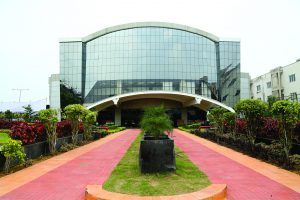The Constitutional Law Society of National Law University Odisha, in collaboration with the Centre for Constitutional Rights, Human Rights Law Network (HRLN), successfully organized the first Lecture as part of its International Law Lecture Series on the topic ‘Recognition of Right to Running Water & Electricity as part of human right and right to dignified existence’. The lecture was delivered by Ms. Maskit Bendel, an attorney based out of Israel. Ms. Maskit has been associated with Association for Civil Rights in Israel (ACRI), which is Israel’s largest human rights organisation and her work has focused on the human rights issues in Israel and Occupied Territories. Recently, she has been at the forefront of a litigation practice that focuses on addressing issues of basic human, civil, gender, social, and prison rights in vulnerable parts of Israel.
Senior Advocate Colin Gonsalves, founder of HRLN commenced the lecture by highlighting the profile of HRLN, a group which has dedicated itself to public interest litigation, litigative training, and pro bono activities in the field of law for over two decades now. In her introduction, Ms. Maskit briefly touched upon the global uniformity of human rights law in light of the prevailing conditions in Israel. She went on to carefully outline the vexing issues afflicting the people of Israel specifically relating to access to water and electricity. She believes that the fundamental issue is the lack of a Constitution and other codified laws.
However, the Supreme Court of Justice has done little to alleviate the problems of the people. Ms. Maskit noted that in such a scenario, the approach of the lawyers is to construct their litigation in order to exhibit the issues as clearly and precisely as possible. The purpose of litigation is also to get the State to define and formulate different human rights and codify them to make them accessible for people. She illustrated how social security benefits were not available to Palestinians and refugees in Israel. Furthermore, the State after 60 years of independence completely gave up the infrastructure and means of supply to private players and the State withdrew from its regulatory role, thereby absolving itself of all responsibilities. Resultantly, the inspection and regulation of these private bodies supplying basic resources like water and electricity became lax and the victims were the most vulnerable class of people. As Ms. Maskit noted, there were several incidents where these corporate entities broke down and services were indefinitely suspended for long periods of time. Ms. Maskit dubs this whole exercise as a ‘Privatization of Welfare’ and reasons that even though the State has given up control of these services, by the seminal nature of these services, these private organisations remain an unbudging organ of the State.
Ms. Maskit also took us through her journey wherein her association worked to articulate issues of human rights into issues of law. The incredible work of her organisation ultimately came to realisation when the State finally defined regulations which established that even when a person is unable to pay for water, access to the same shall not be cut off. To that effect, the State formulated a committee which was to determine if a person was actually capable to pay the bills of water use and this decision would be taken after a comprehensive assessment by the state and not arbitrarily by the suppliers themselves. She notes, the success of this scheme can be surmised from the fact that over the years, such complaints and cases have stopped coming before the committee.
Ms. Maskit notes that while access to clean drinking water was part of a dignified human existence, the access to electricity is a basic tool of survival in today’s world where everything from public education to housing runs on power. A recognition of these basic rights must not only stress upon the financially disadvantaged, but also the geographically, culturally, procedurally and linguistically marginalized sections of the population. A unique approach adopted by her team to recognise this problem before the legislature was to give the affected people a centre stage and voice their concerns first-handed to allow the general public to truly understand these fundamental issues. However, she emphasized on how taking such issues to the Court have been “a double-edged sword” since progressive judgements do not necessarily translate into changing the on-ground realities. Yet, the efficiency of their work is reflected by the fact that even when the country suffered financially during COVID-19, not a single complaint of lack of access or loss of supply was reported to them.
In an interesting cross-border application of human rights law, Ms Maskit recounted a 2013 judgement of the Madras High Court which was essential in persuading the Courts in her litigation for access to electricity. In the case of T.M.Prakash vs The District Collector, the Madras HC directed the State Government to provide electricity connection to the petitioners on grounds that electricity is not a luxury, but a fundamental tenet of existence, and an extension of human rights. This is an example of the universality of human rights law and brought to attention the primary subject of the lecture series, i.e., International Law.
With more than 200 attendees, Ms Maskit concluded her session on the universal problems of poverty and accessibility with a poem by Alon Someck which perfectly summed up the theme of the lecture:
“I was a kid in a house they called a shanty,
in a neighbourhood they called a transit camp.
The only line I saw was the horizon and under it
everything looked poor.”
- Maskit Bendel
For prior information about upcoming CLS-NLUO events, tune into the society’s social media handles and follow them:
Instagram: HERE
Facebook: HERE
LinkedIn: HERE

